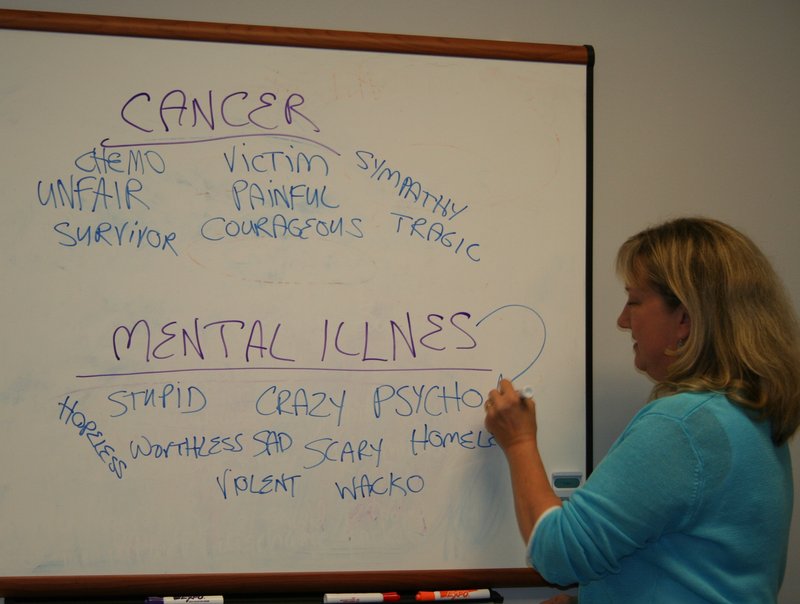FALMOUTH – As a mental health advocate and a volunteer with the Maine chapter of the National Alliance on Mental Illness, I periodically lead a simple yet provocative group exercise in the community.
I start by asking, “What words come to mind when you hear ‘mental illness?’ ” The answers I receive barely differ from group to group and frequently include things like “crazy, scary, psycho, nuts, weird” and “dangerous.”
Then I ask the same group for words they associate with “cancer.” “Survivor” and “courageous” always top the list, followed by “painful, hard” and “support.”
The disparity couldn’t be more startling. Yet both cancer and mental illness are serious, biologically based illnesses. Both claim lives. Both can happen to anyone.
Why the yawning distance between the perceptions of them? Because mental illness still carries profound stigma, the “mark of shame” that for decades has burdened not just those suffering from it, but also their families who feel equally marginalized and isolated.
This fall, a local initiative called “It Takes a Community” is launching a year-long anti-stigma campaign of which I am proud to be a part.
The initiative, organized by Maine Mental Health Partners in South Portland and chaired by Anne Pringle of Portland, is committed to breaking down the barriers to treatment and recovery, and easing the isolation that so many unjustly endure.
In the year ahead, It Takes a Community will make use of online and social media tools and reach out to other community groups and schools to dispel the myths and crippling stigma that still attach to mental illness.
It Takes a Community grew out of an event held at the University of Southern Maine in November 2010 that galvanized a diverse group — those with mental illness, family members, providers and advocates — to begin a dialogue about mental health issues.
We soon zeroed in on addressing stigma as a vital way to help improve the quality of care for those in crisis. You can join us by reaching out and helping raise awareness about the toll stigma takes on our families, friends and neighbors.
I have a loved one with a serious mental illness. Until my life was personally touched by its ravaging effects, I had no idea what people go through when they are ill. These are cruel, terrible illnesses and those afflicted deserve our love, respect, consideration, and support. I am inspired by their courage and fortitude in the face of such adversity.
Mental illness is a brain disorder, not a lack of willpower or the result of weak character.
You cannot pull yourself up by the bootstraps when you are sick with cancer or heart disease; why would you be able to use mind over matter when you have a serious mental illness?
While their expectation of success may have been tragically diminished by illness, those who are affected want the same things out of life as anyone else.
Recovery can be measured by how actively involved they are in their communities. They want to have a life of meaning and purpose and it often takes community support to make a difference in their lives.
Returning to the exercise with which we started, imagine that “cancer” has been crossed out and replaced with “mental illness,” leaving the words “survivor, painful, brave, hard, and support” below it. I dream of a day when these compassionate words will be associated with mental illness.
I am doing what I can in the hopes that someday mental illness will be treated with the same respect, dignity, understanding and quality of care that anyone with a physical illness is entitled to receive.
If we all join together in compassion, acceptance and understanding, I believe we can make stigma a thing of the past.
– Special to The Press Herald
Send questions/comments to the editors.



Success. Please wait for the page to reload. If the page does not reload within 5 seconds, please refresh the page.
Enter your email and password to access comments.
Hi, to comment on stories you must . This profile is in addition to your subscription and website login.
Already have a commenting profile? .
Invalid username/password.
Please check your email to confirm and complete your registration.
Only subscribers are eligible to post comments. Please subscribe or login first for digital access. Here’s why.
Use the form below to reset your password. When you've submitted your account email, we will send an email with a reset code.